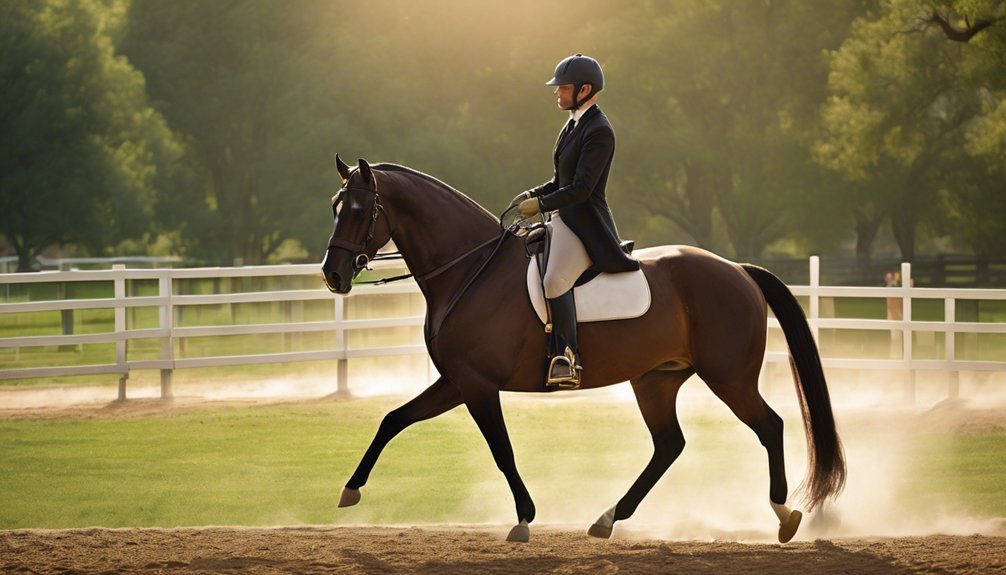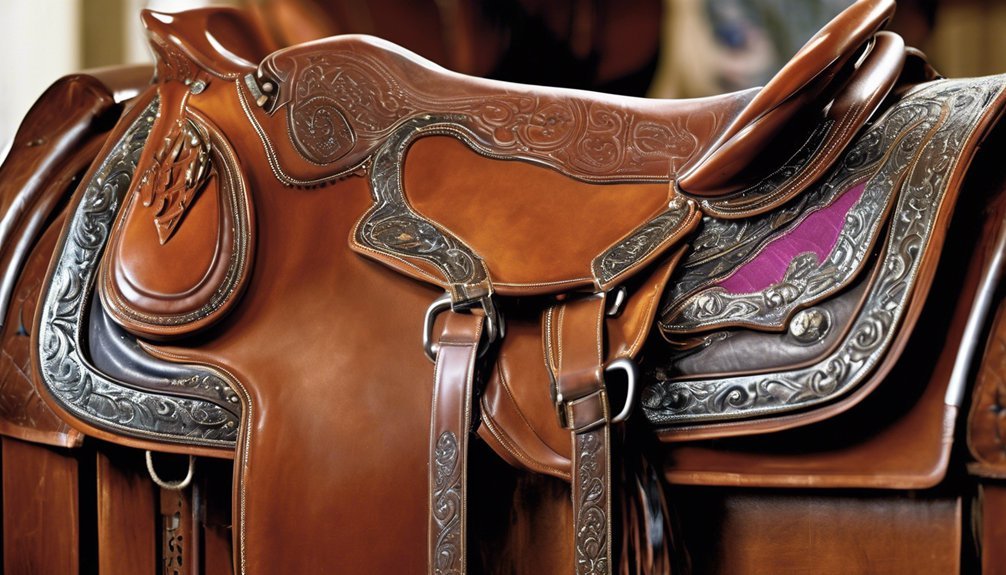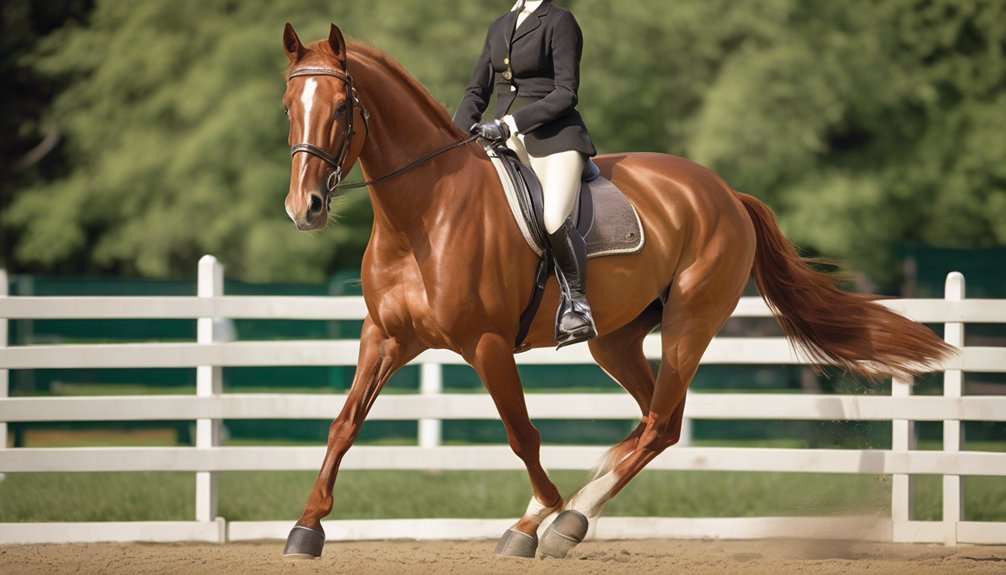
Keeping your horse hydrated during a show is crucial for their performance and overall health. It's important to understand their hydration needs and ensure fresh water is always available, especially in warm weather. By monitoring their intake and recognizing signs of dehydration, you can take proactive steps to support their well-being. Plus, there are effective strategies to encourage them to drink more. Let's explore how to maintain optimal hydration throughout the event.
Key Takeaways
- Ensure fresh, clean water is readily available at all times, especially near stalls and warm-up areas.
- Monitor your horse's hydration status by checking mucous membranes and skin elasticity.
- Use electrolyte supplements before, during, and after competitions to replenish lost minerals.
- Implement water flavoring or hydration games to encourage water intake during shows.
- Regularly assess water intake and environmental conditions to adjust hydration strategies accordingly.
Understanding Your Horse's Hydration Needs

Understanding your horse's hydration needs is crucial for maintaining their health and performance, especially during hot weather or intense exercise.
Horses have specific hydration requirements that vary based on factors like activity level and environmental temperature effects. During warmer months, you'll notice your horse sweating more, which increases their need for water.
It's essential to monitor their intake, as dehydration can lead to serious health issues. Consider providing electrolyte supplements to help replenish lost minerals, particularly after strenuous activities.
Regularly check your horse's skin elasticity and mucous membranes to assess hydration status. By being proactive about your horse's fluid needs, you'll foster a deeper bond and ensure they remain happy and healthy, ready to perform at their best.
Importance of Fresh Water Availability
Providing fresh water at all times is vital for keeping your horse properly hydrated. During a show, the stress of competition can lead to increased fluid loss, making access to fresh water crucial.
Set up hydration stations near your stall or warm-up area, ensuring your horse can drink whenever needed. Horses are more likely to hydrate if they associate water sources with a calm environment, so keep these stations clean and inviting.
Remember, warm weather can intensify your horse's need for water, so check the temperature regularly. By prioritizing fresh water availability, you're not just supporting your horse's health; you're also fostering a sense of well-being and belonging in your equestrian community.
Your horse deserves the best care, and hydration is key.
Using Electrolytes Effectively
While fresh water is essential, using electrolytes effectively can further enhance your horse's hydration, especially during strenuous activities.
Maintaining electrolyte balance is crucial for your horse's performance and well-being. Here are three tips for effective supplementation:
- Choose the Right Electrolytes: Select products that contain sodium, potassium, calcium, and magnesium to support hydration and muscle function.
- Timing is Key: Administer electrolytes before, during, and after intense activities to optimize their effectiveness.
- Monitor Intake: Pay attention to your horse's response. Adjust dosage based on environmental conditions and workload.
Planning Ahead: Packing for Hydration
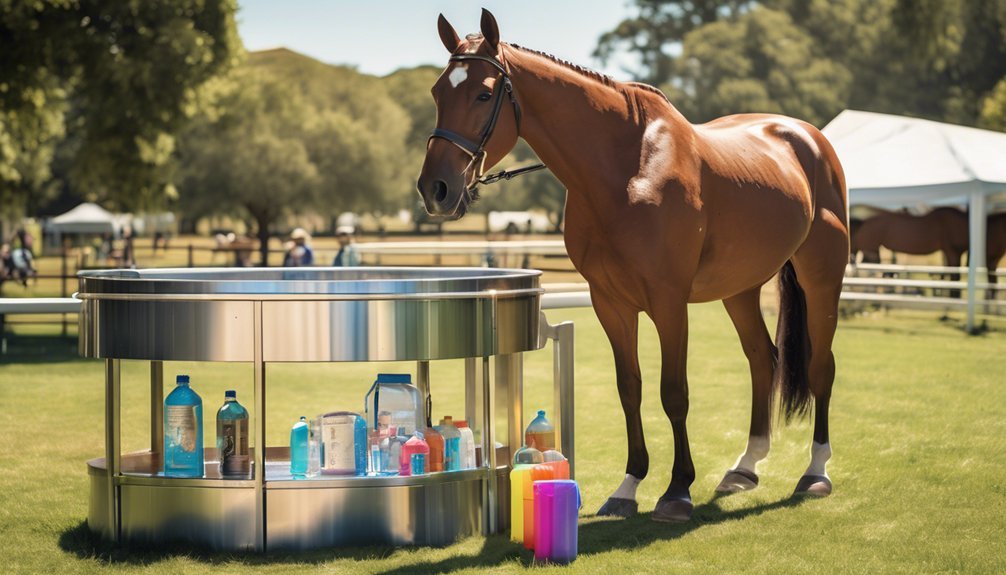
When you plan ahead for your horse's hydration needs, you set the stage for a successful outing, whether it's a long trail ride or a competitive event.
Start by gathering your hydration supplies; include a portable water bucket, a hose, and electrolyte solutions. Don't forget to pack essentials like sponges or mops for easy water access and a collapsible cooler for storing chilled water.
Consider the weather and your horse's activity level when determining how much you'll need. Having these items ready not only ensures your horse stays hydrated but also fosters a sense of community among fellow riders.
When everyone's prepared, you'll feel more connected, creating an enjoyable experience for both you and your horse.
Recognizing Signs of Dehydration
After ensuring you have all the necessary hydration supplies for your outing, it's vital to monitor your horse for any signs of dehydration.
Recognizing dehydration symptoms early can make all the difference. Here are three key indicators to watch for in your hydration assessment:
- Dry mucous membranes: Check your horse's gums; they should be moist and pink.
- Skin elasticity: Pinch the skin on the neck; it should quickly return to its original position.
- Increased heart rate: A resting heart rate above 50 beats per minute may indicate distress.
Strategies for Encouraging Water Intake
To ensure your horse stays properly hydrated, you'll want to implement several effective strategies that encourage water intake. One option is to use water flavoring, which can make plain water more appealing. Experiment with electrolyte solutions or natural flavorings like apple or mint to entice your horse.
Additionally, consider incorporating hydration games; for example, you can use buckets with floating toys to make drinking more engaging. This not only encourages water consumption but also keeps your horse mentally stimulated.
Consistency is key, so offer fresh, clean water regularly and monitor their intake. Remember, creating a positive and enjoyable drinking experience fosters a sense of belonging and care for your horse's well-being.
Hydration During Transportation
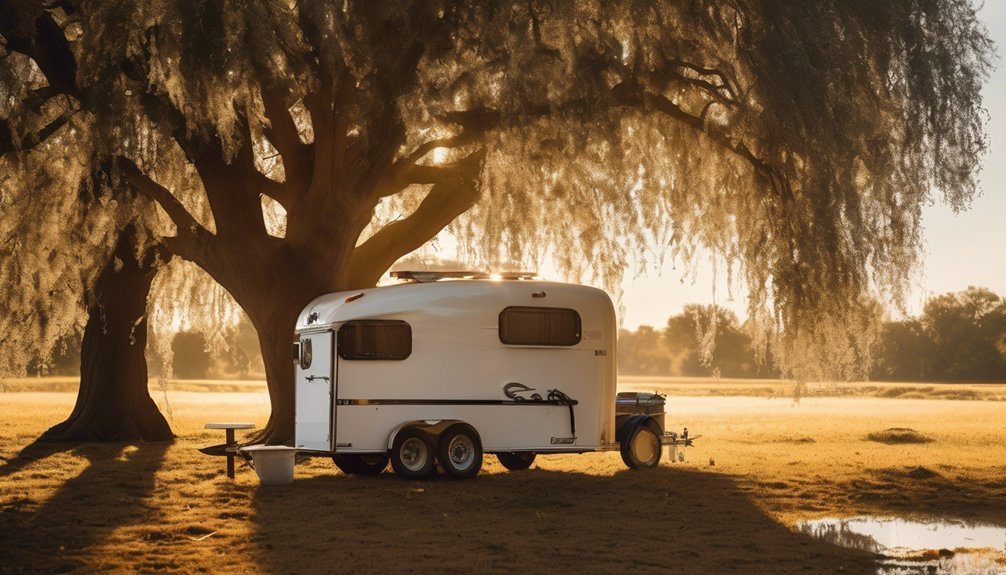
Transporting your horse can pose unique challenges to their hydration needs. To ensure your equine friend stays hydrated on the go, consider these tips:
- Use Proper Hydration Containers: Invest in durable, leak-proof hydration containers that are easy to fill and clean. This will encourage your horse to drink more water during transport.
- Plan Water Stops: Schedule regular breaks during transportation where your horse can access clean water. This helps maintain hydration levels and reduces stress.
- Monitor Temperature: Keep an eye on the temperature inside the trailer. If it's too hot, your horse may become dehydrated more quickly, so adjust ventilation accordingly.
Monitoring Hydration Throughout the Show
While participating in a show, it's crucial to keep a close eye on your horse's hydration levels. Effective hydration monitoring means regularly checking your horse's water intake and noticing any signs of dehydration, such as a dry mouth or lethargy.
Align your checks with the show schedule—before, during, and after each event. Offering water after warm-ups or between classes keeps your horse refreshed and ready to perform.
You might also consider adding electrolytes to their water, especially in hot weather. Engaging with fellow competitors can offer additional tips and support, creating a sense of camaraderie.
Frequently Asked Questions
Can Horses Drink Flavored Water to Encourage Hydration?
Yes, horses can benefit from flavored options to encourage hydration. These flavors can make water more appealing, enhancing hydration benefits. Just ensure the flavors are safe and suitable for your horse's dietary needs and preferences.
How Much Water Does a Horse Typically Need Daily?
A horse typically needs 5 to 10 gallons of water daily, depending on hydration factors like activity level and temperature. Ensuring your horse meets these daily water requirements is crucial for their health and performance.
Are There Specific Types of Water Containers That Work Best?
When choosing water containers, consider portable waterers for convenience and automatic refillers to ensure your horse always has access. They're efficient, helping you maintain hydration without constant monitoring, allowing you to focus on your performance.
Can a Horse Drink Too Much Water at Once?
Yes, a horse can drink too much water at once, leading to potential health risks. You should monitor water intake closely to prevent overhydration, which can increase dehydration risks and disrupt their electrolyte balance.
What Are the Best Feeding Practices to Support Hydration?
To support hydration, incorporate moisture-rich feeds like soaked hay and offer hydration supplements. These practices enhance water absorption, ensuring your horse stays healthy and comfortable, fostering a sense of community among fellow horse owners.
Conclusion
In conclusion, keeping your horse hydrated during a show is crucial for their performance and well-being. Studies show that even a loss of just 2% body weight due to dehydration can negatively impact a horse's performance. By ensuring fresh water is always available, using electrolytes wisely, and recognizing the signs of dehydration, you can help your horse thrive in any competitive environment. Remember, your horse's hydration directly influences their energy levels and overall health.



